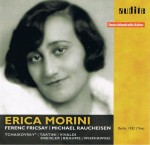 Erica Morini was not merely one of the greatest female violinists but one of the greatest violinists of all time. Born in Vienna in 1905, her father studied with Joseph Joachim. Aged eight she was the youngest student and first female to enter the Vienna Conservatoire. Her artistic individuality, unique sonority and singing quality were frequently more evident than we heard from Heifetz and Oistrakh. Her playing was noted to represent the successful blending of the old-style charm (Kreisler, Elman) with the technical perfection that prevailed from the middle of the 20th century together with a good measure of her own individuality. Audite has released an excellent CD featuring the Tchaikovsky Concerto in D major (audite 95.606). She has other recordings of this concerto but here she is supported by Ferenc Fricsay and the RIAS-Symphony, live in the Titiana Palace, Berlin in 1952. Brilliant performances of shorter works by Tartini, Vivaldi, Kreisler, and Brahms, accompanied by Michael Raucheisen fill the disc. Great sound from Deutschlandradio’s archive tapes.
Erica Morini was not merely one of the greatest female violinists but one of the greatest violinists of all time. Born in Vienna in 1905, her father studied with Joseph Joachim. Aged eight she was the youngest student and first female to enter the Vienna Conservatoire. Her artistic individuality, unique sonority and singing quality were frequently more evident than we heard from Heifetz and Oistrakh. Her playing was noted to represent the successful blending of the old-style charm (Kreisler, Elman) with the technical perfection that prevailed from the middle of the 20th century together with a good measure of her own individuality. Audite has released an excellent CD featuring the Tchaikovsky Concerto in D major (audite 95.606). She has other recordings of this concerto but here she is supported by Ferenc Fricsay and the RIAS-Symphony, live in the Titiana Palace, Berlin in 1952. Brilliant performances of shorter works by Tartini, Vivaldi, Kreisler, and Brahms, accompanied by Michael Raucheisen fill the disc. Great sound from Deutschlandradio’s archive tapes.
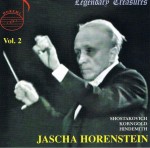 Jascha Horenstein fans will be happy to know that hot on the heels of the Beethoven Ninth DVD, DOREMI has issued Volume 2 of their Horenstein series containing the Prelude and Carnival from Korngold’s 1916 opera Violanta, Shostakovich’s Symphony No.1 and Hindemith’s Symphonie Mathis der Maler (DHR-7998). After a few bars of the Korngold Overture I saw, in my mind’s eye, a pastoral scene from the 1942 film, Kings Row. Of course! Korngold wrote the soundtrack score and expanded the 1916 overture to suit the 1942 film, thematically identical with characteristic orchestrations. Horenstein was one of the finest conductors of his day who, for some reason unknown to me, was never the chief conductor or music director of an orchestra. The Korngold and the Shostakovich are with the Royal Philharmonic, both in excellent stereo recorded in 1965 and 1970 respectively. The Hindemith with the Paris Radio Symphony is a live performance from 1954 that, although missing the refinement of the London orchestra, one senses that the players are doing their very best... Really quite inspiring.
Jascha Horenstein fans will be happy to know that hot on the heels of the Beethoven Ninth DVD, DOREMI has issued Volume 2 of their Horenstein series containing the Prelude and Carnival from Korngold’s 1916 opera Violanta, Shostakovich’s Symphony No.1 and Hindemith’s Symphonie Mathis der Maler (DHR-7998). After a few bars of the Korngold Overture I saw, in my mind’s eye, a pastoral scene from the 1942 film, Kings Row. Of course! Korngold wrote the soundtrack score and expanded the 1916 overture to suit the 1942 film, thematically identical with characteristic orchestrations. Horenstein was one of the finest conductors of his day who, for some reason unknown to me, was never the chief conductor or music director of an orchestra. The Korngold and the Shostakovich are with the Royal Philharmonic, both in excellent stereo recorded in 1965 and 1970 respectively. The Hindemith with the Paris Radio Symphony is a live performance from 1954 that, although missing the refinement of the London orchestra, one senses that the players are doing their very best... Really quite inspiring.
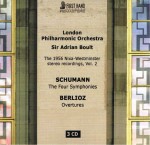 From the early decades of the 20th Century Britain had an impressive array of home-grown, first class knighted conductors including Thomas Beecham, Henry Wood, Hamilton Harty, John Barbirolli, Eugene Goossens, Malcolm Sargent and, of course, Adrian Boult. Boult’s monumental recorded legacy was well captured by HMV and Decca but smaller companies, such Pye, Lyrita and Vanguard filled in the omissions. Such an undertaking was the Nixa/Westminster’s stereo sessions with the London Philharmonic Orchestra over a period of six days in August 1956. The second set of 3 CDs from First Hand Records contains the four Schumann Symphonies and eight Berlioz Overtures (FHR07). I was struck by the sheer energy and astonishing quality of the playing and Boult’s rousing tempi and revealing instrumental balances: the kind that brings a smile to your face. The digital transfers of the analog master tapes were done at Abbey Road Studios by Ian Jones and retain the full impact and weight of the originals, adding to the credibility of the performances. This is a superb set in every respect and an essential acquisition for Schumann lovers.
From the early decades of the 20th Century Britain had an impressive array of home-grown, first class knighted conductors including Thomas Beecham, Henry Wood, Hamilton Harty, John Barbirolli, Eugene Goossens, Malcolm Sargent and, of course, Adrian Boult. Boult’s monumental recorded legacy was well captured by HMV and Decca but smaller companies, such Pye, Lyrita and Vanguard filled in the omissions. Such an undertaking was the Nixa/Westminster’s stereo sessions with the London Philharmonic Orchestra over a period of six days in August 1956. The second set of 3 CDs from First Hand Records contains the four Schumann Symphonies and eight Berlioz Overtures (FHR07). I was struck by the sheer energy and astonishing quality of the playing and Boult’s rousing tempi and revealing instrumental balances: the kind that brings a smile to your face. The digital transfers of the analog master tapes were done at Abbey Road Studios by Ian Jones and retain the full impact and weight of the originals, adding to the credibility of the performances. This is a superb set in every respect and an essential acquisition for Schumann lovers.
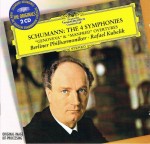 I compared this set to a reissue on DG Originals of the 1963/64 recordings of the Schumann Symphonies with Raphael Kubelik and the Berlin Philharmonic (DG 4778621, 2 CDs). Kubelik’s polished interpretations of the works differ from Boult in that they are quite stately with the conductor’s ear for orchestral balances putting a lie to the persistent but erroneous belief that Schumann’s orchestrations were dense and should be reworked. In fact, Gustav Mahler did do some re-orchestrations. The latest digital processing is impressive with meticulous details. But for me, the Boult set gets the vote for both performance and sound.
I compared this set to a reissue on DG Originals of the 1963/64 recordings of the Schumann Symphonies with Raphael Kubelik and the Berlin Philharmonic (DG 4778621, 2 CDs). Kubelik’s polished interpretations of the works differ from Boult in that they are quite stately with the conductor’s ear for orchestral balances putting a lie to the persistent but erroneous belief that Schumann’s orchestrations were dense and should be reworked. In fact, Gustav Mahler did do some re-orchestrations. The latest digital processing is impressive with meticulous details. But for me, the Boult set gets the vote for both performance and sound.
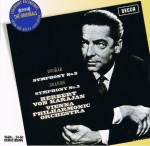
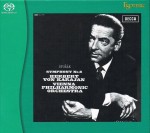 Another Originals reissue comes from the Decca catalogue revisiting Herbert von Karajan conducting the Vienna Philharmonic in the Dvorak Eighth Symphony and the Brahms Third (Decca 4782661). These recordings of 1961/63 have justifiably remained in the catalogue for close to half a century. The new mastering is clear and fresh with a natural, pleasant stage presence, accurately conveying the original John Culshaw production. HOWEVER, Esoteric, the Japanese high-end audio equipment company, has issued a hybrid SACD which they prepared, using state-of-the-art technology, from masters supplied by Decca (ESSD 90036). Both sound very good but the Japanese is somewhat more clinical and seems to miss the natural acoustic of the Sofiensaal compared to the natural ‘feel’ of the European disc. The differences are small but telling. Small differences, in this case, come at a large price: $75 versus $16 for the European edition.
Another Originals reissue comes from the Decca catalogue revisiting Herbert von Karajan conducting the Vienna Philharmonic in the Dvorak Eighth Symphony and the Brahms Third (Decca 4782661). These recordings of 1961/63 have justifiably remained in the catalogue for close to half a century. The new mastering is clear and fresh with a natural, pleasant stage presence, accurately conveying the original John Culshaw production. HOWEVER, Esoteric, the Japanese high-end audio equipment company, has issued a hybrid SACD which they prepared, using state-of-the-art technology, from masters supplied by Decca (ESSD 90036). Both sound very good but the Japanese is somewhat more clinical and seems to miss the natural acoustic of the Sofiensaal compared to the natural ‘feel’ of the European disc. The differences are small but telling. Small differences, in this case, come at a large price: $75 versus $16 for the European edition.
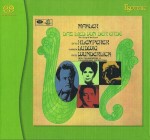 Another Esoteric hybrid SACD that can be unhesitatingly recommended is the Klemperer EMI recording of Mahler’s Das Lied von der Erde with Fritz Wunderlich, Christa Ludwig and the Philharmonia Orchestra recorded in February and November 1964 and July 1966 (ESSE 90043). This performance has been criticized by some for slow tempi but for those listeners who absorb the text of each of the six individual songs, Klemperer’s pulse and phrasing reflect total empathy. The original EMI recording is available on an EMI CD in their Great Recordings of the Century re-issues priced at around $15 (0724356694422) but for those for whom price is no object the spacious sound and refinement of the Esoteric SACD at $75 will be irresistible. American Sound in Richmond Hill (905 886 7810) has these and many others from Esoteric including the SACDs of Solti’s Ring Cycle.
Another Esoteric hybrid SACD that can be unhesitatingly recommended is the Klemperer EMI recording of Mahler’s Das Lied von der Erde with Fritz Wunderlich, Christa Ludwig and the Philharmonia Orchestra recorded in February and November 1964 and July 1966 (ESSE 90043). This performance has been criticized by some for slow tempi but for those listeners who absorb the text of each of the six individual songs, Klemperer’s pulse and phrasing reflect total empathy. The original EMI recording is available on an EMI CD in their Great Recordings of the Century re-issues priced at around $15 (0724356694422) but for those for whom price is no object the spacious sound and refinement of the Esoteric SACD at $75 will be irresistible. American Sound in Richmond Hill (905 886 7810) has these and many others from Esoteric including the SACDs of Solti’s Ring Cycle.
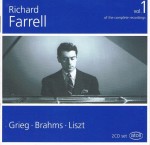
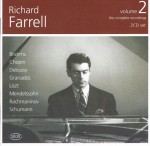 “There are three pianists in the world – Kapell, Farrell, and myself” said Arthur Rubinstein. Richard Thomas Farrell (1926-1958), born in Wellington, New Zealand was a child prodigy. He was taken to Australia in 1938 and studied at the Conservatorium in Sydney. In 1947 he met William Kapell who helped in arranging a full scholarship to study at Juilliard with Olga Samaroff who said Farrell was the best student she ever had. He played with major American orchestras and toured extensively before moving to London in 1951 where he gave recitals, played chamber music and played with the best orchestras, and the most prestigious conductors. It was a great loss to music when he died in a car accident in Sussex, aged 31. Unlike his contemporaries, Dinu Lipatti and William Kapell, memories of his career and recorded legacy have unjustifiably almost completely faded. He made a handful of outstanding recordings for Pye, some unissued until now. Atoll, an independent record label in New Zealand (www.atollcd.com), has issued Farrell’s complete recordings including the unissued ones on four CDs in two volumes. I’m afraid that there are not enough adjectives in the language
“There are three pianists in the world – Kapell, Farrell, and myself” said Arthur Rubinstein. Richard Thomas Farrell (1926-1958), born in Wellington, New Zealand was a child prodigy. He was taken to Australia in 1938 and studied at the Conservatorium in Sydney. In 1947 he met William Kapell who helped in arranging a full scholarship to study at Juilliard with Olga Samaroff who said Farrell was the best student she ever had. He played with major American orchestras and toured extensively before moving to London in 1951 where he gave recitals, played chamber music and played with the best orchestras, and the most prestigious conductors. It was a great loss to music when he died in a car accident in Sussex, aged 31. Unlike his contemporaries, Dinu Lipatti and William Kapell, memories of his career and recorded legacy have unjustifiably almost completely faded. He made a handful of outstanding recordings for Pye, some unissued until now. Atoll, an independent record label in New Zealand (www.atollcd.com), has issued Farrell’s complete recordings including the unissued ones on four CDs in two volumes. I’m afraid that there are not enough adjectives in the language 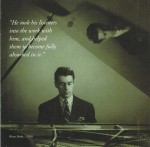 to fully describe the feeling of well-being and euphoria in Farrell’s music making which I believe to be peerless. The composers on these discs are all of the Romantic era, from Chopin to Rachmaninov. The sensitivity and clarity of his playing is immediately engaging, with the listener (this one) hanging on every note. He had a measure of personal touch which was always at the service of the composer, now delivering to the listener of these recordings music-making of the very highest order. Richard Farrell brings new excitement and insights to familiar repertoire making listening an experience of rewarding re-discovery. These recordings, all made by Pye between 1956 and 1958 are now owned by EMI who licensed them to Atoll. The excellent transfers from the original tapes were made at Abbey Road Studies in London by Ian Jones.
to fully describe the feeling of well-being and euphoria in Farrell’s music making which I believe to be peerless. The composers on these discs are all of the Romantic era, from Chopin to Rachmaninov. The sensitivity and clarity of his playing is immediately engaging, with the listener (this one) hanging on every note. He had a measure of personal touch which was always at the service of the composer, now delivering to the listener of these recordings music-making of the very highest order. Richard Farrell brings new excitement and insights to familiar repertoire making listening an experience of rewarding re-discovery. These recordings, all made by Pye between 1956 and 1958 are now owned by EMI who licensed them to Atoll. The excellent transfers from the original tapes were made at Abbey Road Studies in London by Ian Jones.
Volume 1 (ACD208, 2 CDs) contains the Grieg Piano Concerto, op.16 and the Liszt Piano Concerto no.1 in E flat, both with the Halle Orchestra under George Weldon. The solos: Brahms’ 4 Ballades op.10 and 16 waltzes, op.39; Grieg’s Ballade in G minor, op.24, 2 Popular Norwegian Melodies, op.66 nos. 14 and 17, and 9 Lyric Pieces. The Grieg works are monaural recordings.
Volume 2 (ACD909, 2 CDs) is a treasure trove of solo performances. Seven pieces by Rachmaninov include the Corelli Variations op.42 and six Preludes from Op.3, op.23 and op.32. There are 11 works by Chopin. The Brahms works include the Handel Variations, op.24, four pieces from op.119 and the Rhapsody in G minor, op.79 no.2. Three pieces by Liszt include the Rigoletto Paraphrase. A special performance of Schumann’s Arabeske op.18 is followed by one piece each by Mendelssohn, Debussy, and Granados.
I purchased my copies from Presto Classical in the U.K. (prestoclassical.co.uk) but Atoll will ship direct from New Zealand (atollcd.com).



